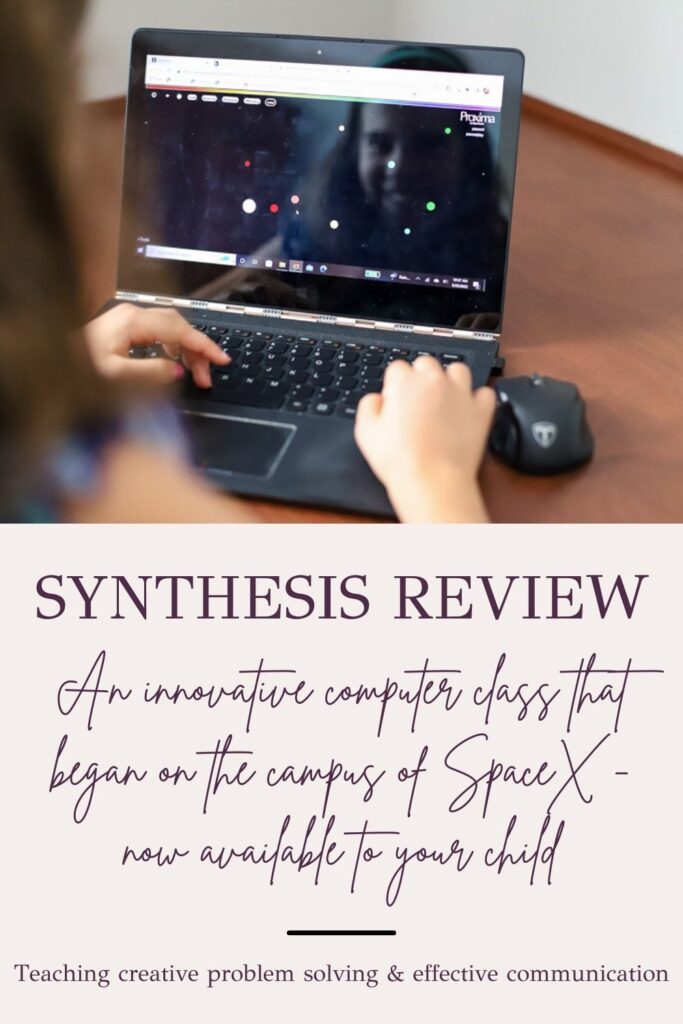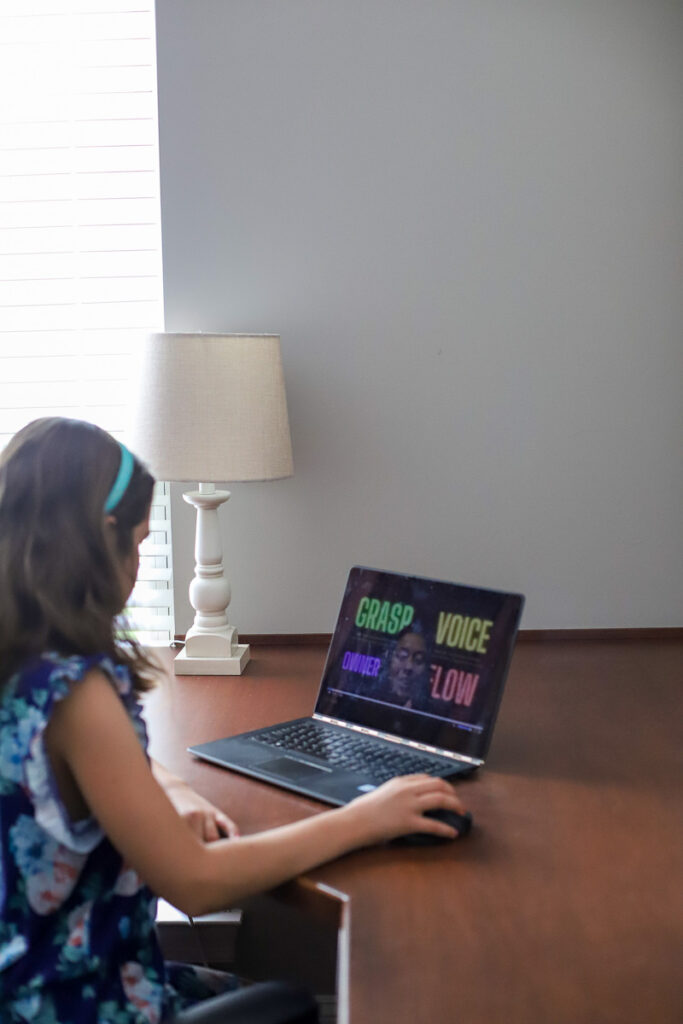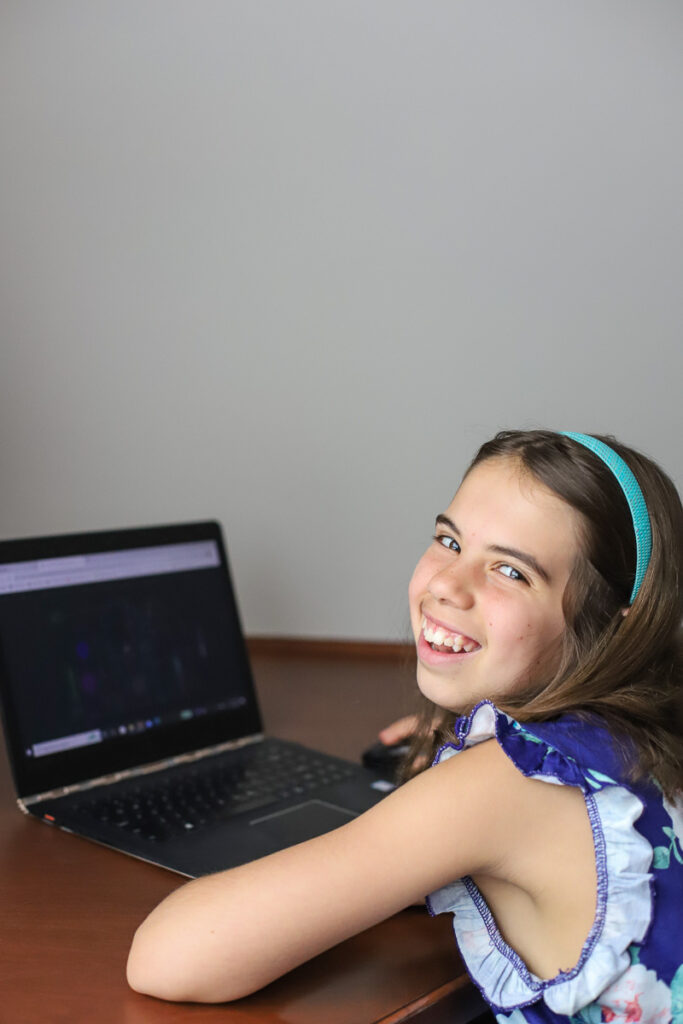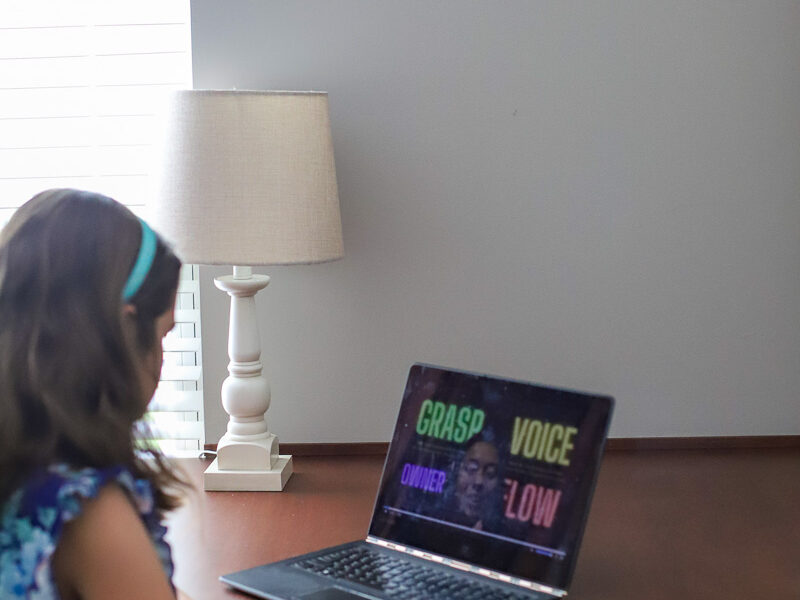While I have homeschooled for “only” 5 years, I’ve seen the space absolutely explode with opportunities over that time. Online offerings are one area we’ve slowly taken more advantage of as my children get a little older (10 and 8) and have the skills to use a computer. We began with Codeverse and Spanish Academy and expanded a couple months ago to include Synthesis for Hailey.
Not really knowing what to expect at first, I’ve fallen in love with the collaborative learning program that teaches children how to develop critical thinking skills. Though she attends the weekly cohorts completely on her own (they encourage little to no parent involvement), they kicked things off with a parent session that spoke to our top goals (growth mindset, creative problem solving, group communication and goal reaching with people from all over the world, etc). They also send weekly emails to parents with updates and video snippets from your child’s session so I can get an understanding of what they are doing and her personal growth.
I’ve shared snippets of our experience and how I love that it is encouraging Hailey to be a thoughtful decision maker and an effective communicator. I was inspired to put together a post breaking down the details in case you think it might be a good fit for your child as well. While we homeschool, this is not a program exclusive for homeschoolers; it’s open to anyone looking for a unique and enjoyable challenge for their kids.

All About Synthesis
Synthesis was co-founded by Josh Dahn, who previously created the school Ad Astra on the SpaceX campus. Josh had been a teacher at the private school that Elon Musk’s kids went to, and after talking about what they didn’t like about that school, Elon invited Josh to create his own school for Elon’s kids and the kids of the SpaceX employees.
Synthesis was one of the classes at the Ad Astra school, and it’s now available as an extracurricular program for kids all over the world.
Here’s how it works:
Each child has a home cohort
Synthesis is available for kids ages 6 to 15, and students are grouped up by age (6-7; 8-10; 11-13, and 15-15).
When signing up, you can pick a cohort time that works best for your schedule. Cohorts happen around the clock, and your child might get to meet kids from different countries.
New cohorts launch with all-new kids, so children don’t have to worry about not knowing what to do. Everyone is in the same boat.
Keep in mind that there is a waitlist. Synthesis is very picky about who they hire for teachers. The acceptance rate for teachers is less than 4%, which is the main cause of the waitlist.
Home cohort sessions take place once a week
Your child will attend their main cohort once a week, every week. They’ll see the same kids each week and make friendships. This can help some of the shier kids feel more comfortable speaking up. Meanwhile, the louder kids will learn to encourage their quieter friends to share their perspectives too.
Kids play games and simulations together
During the cohort sessions, kids play Synthesis games together. The company has several proprietary games designed to get kids thinking outside the box and collaborating.
For example, in Art for All, kids create an art museum and have to decide which art pieces they want to bid at and at what prices. Constellation and Proxima are space exploration games. In Fish, kids have to fish to feed the village without depleting any species.
Sessions are complex and open-ended
Unlike school, which has lessons, right answers, and instructions, Synthesis gameplay sessions are completely open-ended.
Teachers don’t share the rules, but instead allow the kids to figure out the games all on their own. After the kids are comfortable with the games, teachers even allow the kids to decide how they want to play them. For example, kids decide how to break up the cohorts into groups and what team sizes are best for each game.
Teachers facilitate discussions and decision-making
Teachers take on more of a facilitator role. They help the kids learn how to phrase their hypotheses about the games and decide which ideas to test.
They help the kids make these decisions themselves rather than call on kids and pick the best ideas.
Teachers also help the kids break down the results of the games after the fact. They encourage students to analyze their performance and discover why certain teams did better than others.
Students are encouraged to work through uncertainty
With no pre-set rules or right answers, there can be a lot of chaos in Synthesis cohorts. Students are encouraged to “embrace the chaos” and speak up even when they’re not sure about something.
For example, a teacher might prompt students by saying, “What do you know about this game and what do you not know about this game?” or “What are you confused about?” to get the discussion started.
These sorts of questions help kids to be comfortable sharing uncertainty, rather than believing they should only speak up if they know the answer.
After 3 months, kids unlock more experiences
Home cohorts are only the beginning. After they complete 3 months of Synthesis, students can join in additional gameplay sessions whenever they want and interact with new kids from around the world. There are also special community events, like an Ask Me Anything with an astronaut.

The 4 Synthesis qualities (and why they’re great for kids)
Synthesis has 4 core qualities that guide everything in the program. Teachers communicate about these qualities regularly with students and give praise as the students develop them.
1. Grasp
- What this is: This quality is all about figuring out the games and what works and what doesn’t.
- How kids practice it in Synthesis: Students play games before they know the rules, and work together to figure things out.
- How it helps: Kids develop critical thinking, understand what they do know versus what they don’t know, and are motivated to uncover what they don’t know.
2. Voice
- What this is: This quality refers to how kids communicate, how they take turns speaking and listening.
- How kids practice it in Synthesis: Kids are encouraged to voice their ideas, even when they’re unsure about them. They’re also encouraged to help facilitate collaboration and source ideas from their team.
- How it helps: Kids learn to work through problems rather than leave it at “I don’t know.” They gain experience and comfort with speaking up and learning how to give others the space to share.
3. Ownership
- What this is: This quality is all about taking ownership of what occurs during a session and the results.
- How kids practice it in Synthesis: Kids separate criticizing themselves from their ideas or test runs. They practice not taking analysis personally.
- How it helps: Synthesis kids develop a growth mindset and see failure as a normal part of problem solving.
4. Flow
- What this is: This quality refers to enjoying the process of problem solving, rather than obsessing over getting to the end result.
- How kids practice it in Synthesis: Synthesis is designed to be a lot of fun. Kids will be so focused on working together and playing the games that they’re naturally living in the moment and staying in the process. Kids also learn how to help each other stay in the flow and become a good teammate.
- How it helps: This quality sets kids up to be great problem solvers because they won’t put too much pressure on themselves, their team, or the process.

Hailey’s thoughts on Synthesis
“That was so fun!” exclaimed Hailey after her first cohort, emerging from the office with a large and genuine grin on her face. I was thrilled to see her enthusiasm, especially after her initial approach to the class was uneasiness. Hailey is my child that needs to know exactly how things work and exactly what to expect before proceeding with any task. For this reason, I was even more committed to enrolling her in Synthesis since the program encourages children to embrace the chaos and get uncomfortable with the unknown while taking on new challenges.
She looks forward to her weekly cohort, wanting to log on early to ensure she doesn’t miss a moment. At the end of her sessions you can almost feel her creative energy and excitement exuding from her. Synthesis challenges her and lights her up at the same time. She takes pride in explaining to me what she and her team discussed and implemented each week and I get so much joy in watching her grow in confidence!
Who I’d recommend Synthesis to
I’d recommend this program to anyone looking for a unique way to challenge your child’s thinking and problem solving process in a way that is fun for them. Teaching our kids how to think rather than what to think has been a longstanding goal of ours. Synthesis partners well in that mission by encouraging creative problem solving, teamwork, and teaching my agreeable and initially soft spoken child to voice her thoughts and opinions. It’s been incredible to see her gain confidence in speaking up and working together with others to solve problems in a fun way. She always walks out of a session with a big smile on her face!


Alyssa says
This sounds like such an interesting program! I’m glad I read through the post as based on the title, I didn’t think you guys had liked it. I love that they get to build relationships with the same kids every time. Once my daughter is a little older, this might have to be something that we try out!
Brittany Dixon says
It took me at least a month to understand what it actually was but I’m glad you got that we liked it! We are breaking for June, but picking it back up in July; it’s been such a good experience for H! Mayeb I need a new title to this post to convey that 🙂
Brittany Greer says
Oh my gosh too funny. Josh is my cousin! 🙂 I thought it was cool you wrote a post on Synthesis and was curious what you had to say, but didn’t expect you to actually have his name in there. So proud of him! And glad you and your girls love it so much!
Brittany Dixon says
Oh my goodness, what a small world! And yes, the program is super cool; H has loved it!
Jennifer says
Curious if you are still doing Synthesis and any feedback after doing it longer term?
Brittany Dixon says
We are still doing Synthesis! However, just a week ago they changed the structure fairly significantly. The classes are no longer moderator led and the hours have changed, so we are going to give it a try for a couple weeks and see if it continues to work for us or not. We did purchase the Synthesis Tutor for both kids and I’ve been a big fan of that!
Jennifer Wenzel says
So do you do Teams and Tutor? And it’s still Wed/Sat- did they just adjust the times a little?
Brittany Dixon says
We’ve done both teams and tutor. Teams just switched to the wed/sat option which I’m not sure will work for us, so that’s why I’m undecided on it at the moment.
Sou says
Hi Brittany, great article. I find it extremely helpful. We are looking into this for our son. I have a few questions…1. I’m not quite sure I understand the difference between Teams and Tutor. 2. how long are the weekly sessions 3. do you know their cancellation policy? Thank you!
Brittany Dixon says
Hi! So a few things have changed in the way they do things since this was written. Teams are a live interaction between kids from all over the world gaming and problem solving together. Tutor is completely AI driven lessons that adjust feedback and direction individually to your child’s responses and needs.
Brittany Dixon says
The team sessions are now “open hours” twice a week (Wednesdays and Saturdays) for a few hours where they can join in for as long as they’d like. I believe the cancellation policy is to cancel at any time with a 30 day notice, but definitely check on that to verify.
Jennifer says
Would this be a full math curriculum or would we still need to do traditional math lessons?
Brittany Dixon says
If I was starting from a young age (5/6) I think it could stand as it’s own curriculum, but I’ve felt most comfortable to stay the path with our Saxon math lessons as well.
CMax says
Would this be a good supplement for a child who is in traditional school, and struggling with math in the classroom?
Brittany Dixon says
I think it definitely could be- the Synthesis Tutor, not the teams. They teach the basics of math (and beyond) in a very engaging way.